FC Barcelona
![]()
The title of this article is ambiguous. For other meanings, see FC Barcelona (disambiguation).
Futbol Club Barcelona is a sports club from the Spanish city of Barcelona. Also known only by its short form Barça [ˈbaɾsə], the club plays in the Primera División with its first professional men's football team since 1929.
The club was founded as Football Club Barcelona in 1899 by a group around the Swiss Joan Gamper and developed, especially under the Franco dictatorship, into a symbol of the cultural identity of Catalonia and Catalanism. The conflict between the Catalans, who were striving for independence, and the Spanish central state, which at the time was increasingly manifested in sport, has resulted in a rivalry with the capital club Real Madrid that continues to this day. The clash between the two clubs is known as El Clásico and is considered one of the most important football matches in the world. True to its club motto Més que un club ("More than a club"), FC Barcelona continues this symbolism to this day, cultivating its image in the 21st century through social commitment.
In Spain, the club is the record cup winner and the club with the second most national championship titles. At European club level, FC Barcelona's greatest success to date came in 1992 when they won the European Champion Clubs' Cup (now the UEFA Champions League) for the first time. Prior to that, the club had won the European Cup Winners' Cup three times. Since then, the club has won Europe's premier club trophy four more times. In 2009, the Catalans became the first Spanish club to achieve the so-called triple, which includes winning the Spanish championship, the Spanish Cup (Copa del Rey) and the UEFA Champions League. A few months later, FC Barcelona also won the UEFA Super Cup, the Spanish Super Cup (Supercopa de España) and the FIFA Club World Cup, making them the first football club to win six titles in one year. In 2015, FC Barcelona also became the first Spanish club to win the treble for the second time.
The club is organized as a non-profit association and is owned by its members. With 143,459 members, FC Barcelona is the seventh largest sports club in the world. It is known for its prolific youth work, which encourages the offensive short passing game, Tiki-Taka, from an early age. FC Barcelona also owns the Camp Nou, the largest football stadium in Europe.
The club also includes other professional sports sections, namely handball, basketball, futsal and roller hockey. In addition, there are sports sections in ice hockey, baseball, rugby, volleyball and athletics, among others. The handball department is the most successful team at European club level, having won nine EHF Champions League titles. The basketball team won the EuroLeague, the highest title in European basketball, in 2003 and 2010.
History
The foundation (1899-1908)
"Our friend and partner, Mr. Kans Kamper, of the football section of "Sociedad Los Deportes" and former Swiss champion, wishing to organize some games in Barcelona, requests anyone who likes this sport to contact him, to come to his office on Tuesdays or Fridays from 9 to 11 o'clock in the evening."
- Advertisement in the magazine Los Deportes, 22 October 1899
It all started with a simple classified ad in Los Deportes, a magazine founded by Joan Gamper of Switzerland. The 22-year-old at the time wanted to found a football club in Spain that, unlike the few Catalan football clubs that existed there, would also accept foreigners. Interested parties were asked to contact the editorial office. The meetings that followed led to the founding of Football Club Barcelona on 29 November 1899. The English name underlined the Anglophile attitude of the founding members, over half of whom were foreigners and Protestants.
The first president was Walter Wild from Switzerland, and the first captain was Gamper, the club's founder. FC Barcelona played its first match on 8 December 1899 against a selection of local Englishmen at the Velòdrom de la Bonanova. Barcelona lost 1-0 with a goal from English Barcelona player Arthur Witty, who started for his compatriots so that both teams could field ten players.
In 1900, the first Catalan championship was held under the name Copa Macaya. Barcelona finished second behind Hispània AC. A year later, the club won its first title in this competition.
Barça became one of Spain's top clubs early on when they reached the final of the first Spanish Cup in 1902, losing 2-1 to Basque side Vizcaya de Bilbao. This was preceded by their first meeting with Real Madrid on 13 May 1902 in the Copa de la Coronación (Alfonso XIII Coronation Cup), a predecessor to the Copa del Rey. FC Barcelona, at that time already with six foreigners (among them Udo Steinberg) in their ranks, could beat the just founded Real Madrid, at that time still under the name Madrid Foot-Ball Club, in the Spanish capital with 3:1. German Udo Steinberg scored the first two goals for Barcelona, making him the first scorer in El Clásico.
In 1908, the first sporting and financial crisis threatened the existence of the club. Barcelona had not won a title since winning the Catalan championship in 1905 and was on the verge of bankruptcy. Many members had left the club, with only 38 remaining. Vicenç Reig resigned as president after 22 days and declared the club effectively dead in his farewell speech.
The heyday (1908-1929)
The club's saviour turned out to be Joan Gamper, who by now called himself Joan Gamper, in keeping with the Catalan form of his name, and now served as the club's president for the first time. Gamper had become more and more a supporter of Catalanism in the previous years. This circumstance led him back to FC Barcelona, from which he had in the meantime moved away due to the increasing Catholicisation of the club. During Gamper's first of five terms, Barça received its first dedicated stadium, the Camp del Carrer Indústria, where the team played from 1909. After less than a year, Gamper stepped down as president for professional reasons, leaving behind a club with a solid sporting record, which went on to win three consecutive Catalan championships between 1909 and 1911.
Gamper took over as president for the second time in 1910. The foundation stone for the first Spanish championship had been laid the year before with the creation of the FECF, the first national football federation. The Copa del Rey, which had already been held as an invitational tournament in previous years, was declared the first championship in 1910 as a result of the federation's foundation. Apart from Barcelona, only two other teams took part and played a round-robin tournament against each other in the capital Madrid. After both FC Barcelona and Español de Madrid had won against Deportivo La Coruña, the two rivals met in the final match. The Madrid club led 2-0 at the break before Barcelona turned the game around in the second half to win the first Spanish championship with a 3-2 victory. However, with the creation of the Primera División in 1929, previous Copa del Reys were retrospectively counted as Spanish Cup victories.
From 1911 to 1914, FC Barcelona won the Pyrenees Cup, one of the first international football tournaments, four times in a row. In 1912, 15-year-old Filipino striker Paulino Alcántara made his debut, and his 369 goals for FC Barcelona were a club record until 2014. In his first game in the Catalan championship, the striker, known for his shooting power, scored three goals. In the following four years, the club won the Catalan championship and the Copa del Rey twice each. In 1917, FC Barcelona had its first coach in Englishman John Barrow. A few months later, Barrow's compatriot Jack Greenwell took over as coach for seven years. Two years later, FC Barcelona made the transition to a professional club, signing two stars in 1919. The first was 17-year-old attacking player Josep Samitier, nicknamed El Mag ('The Magician') for his creativity and range. The second new signing was goalkeeper Ricardo Zamora, considered one of the best goalkeepers of his time due to his reaction speed. With Greenwell as coach and Alcántara, Samitier, Sagi-Barba and Zamora as players, Barça's Golden Decade began with the 1918/19 season, in which the team triumphed nine times in the Catalan championship and five times in the Copa del Rey.
During Gamper's third term (1917-1919), the club identified more and more with Catalonia. The club introduced Catalan as a language within the club. In addition, on 23 July 1920, the club Catalanised the first half of its club name and was henceforth called Futbol Club Barcelona. In 1921, Joan Gamper contributed one million pesetas to the construction of a new 20,000-seater stadium. With the inauguration on 20 May 1922, the Camp de Les Corts football stadium became the new home of FC Barcelona. The club's growth during this period was also reflected in an increase in popular support, so that by the end of Gamper's fifth and final term (1924-1925) the club had 12,207 members.
During the military dictatorship of General Miguel Primo de Rivera (1923-1930), the Les Corts stadium was forcibly closed for six months in 1925 following a scandal during a friendly match against an English amateur team. Before the start of the match, first the English and then the Spanish national anthem had been played. To express Catalonia's desire for autonomy, the spectators started to whistle during the Spanish anthem. The military regime of general and dictator Miguel Primo de Rivera then closed the stadium for six months. Joan Gamper was also removed as club president and told to leave the country as soon as possible.
In 1928, FC Barcelona won the Copa del Rey after beating Real Sociedad San Sebastián in three finals. Barcelona's success was largely down to Hungarian keeper Ferenc Plattkó, to whom the Spanish poet Rafael Alberti subsequently dedicated the Oda A Platko. In 1929, Barcelona crowned their Golden Decade by winning the inaugural Primera División. Thanks to a strong second half, FC Barcelona won the first Spanish league by two points ahead of Real Madrid.
Under the influence of politics (1929-1944)
The successful 1920s were followed by a period of decline for FC Barcelona. Although the club continued to have players like Josep Escolà and Martí Ventolrà, the difficult political times meant that the sport became less and less important. Barça faced economic, political and sporting problems and membership numbers steadily declined. In 1932, footballer Josep Samitier moved to arch-rivals Real Madrid due to internal disputes. As a result, Barça never finished better than third in the Spanish league up to and including 1944, and even finished the 1933/34 season in second-to-last place. The club was lucky not to be relegated due to the expansion of the league to twelve clubs. Only in the Catalan championship, which was held for the last time in 1938, the club continued to collect titles and from 1930 increased the record by six more titles. In 1930, the club's depression-stricken founder Joan Gamper shot himself after losing his entire fortune in the wake of the Great Depression.
When the Spanish Civil War broke out in 1936, the Spanish championship was stopped for a total of three years. In the same year, Josep Sunyol, then president of the club and deputy of the separatist ERC, was executed by troops of the future dictator Francisco Franco. The club's membership fell steadily and by the beginning of the Franco regime stood at 3486. FC Barcelona was effectively on the brink of extinction. As a result, the team toured the United States and Mexico to stave off financial ruin. The proceeds from North America restored the club to financial solvency, but following the trip almost three-quarters of the players broke away from the team and went into exile in Mexico or France. On 16 September 1938, the club's ground was bombed by the fascists. A few months later Franco came to power and from then on was keen to suppress all regional autonomy efforts. In March 1940, Enrique Piñeyro, a collaborator close to Franco, was appointed president of FC Barcelona. In addition, the club's crest was modified so that the Catalan flag no longer appeared in it, and on 15 January 1941 the club's name was changed to the Spanish variant Club de Fútbol Barcelona. Meanwhile, the stadium became a meeting place for Catalans to communicate and discuss political issues in the officially banned Catalan language.
Meanwhile, in the Republican zone, eight clubs from Catalonia and the Valencia region played in the so-called Liga Mediterránea (Mediterranean League) in 1936/37. The champions were FC Barcelona and the cup winners were UD Levante. In 2007, the Spanish Senate unanimously decided to retroactively recognise Levante as the 1937 Spanish Cup winners. However, the Spanish Football Federation rejected this decision two years later, as well as FC Barcelona's attempt to retroactively obtain the 1937 Spanish championship title.
The Spanish league resumed with the 1939/40 season. With a few exceptions, a completely new FC Barcelona finished ninth and fourth in the first seasons after the end of the civil war. FC Barcelona ended the 1941/42 season with their worst league finish to date. After finishing twelfth in the table, the team secured their place in the relegation play-offs against Real Murcia. In return, FC Barcelona won the Spanish Cup for the first time in 14 years that season. A season later, defending champions FC Barcelona faced Real Madrid in the semi-finals of the Spanish Cup, which was called the Copa del Generalísimo from 1939. Barcelona won the first leg 3-0, but the second leg turned into a scandalous match, Barcelona lost 1-11 and were forced to play on by state security.
Creation of the Five Cups Barça and Camp Nou (1944-1961)
The year 1944 marked a turning point in the history of FC Barcelona: the first official supporters' club (Penya) was created to support the club financially, and the number of members rose again to over 20,000. Despite the difficult political situation, Barcelona, with Josep Samitier as coach and players such as César Rodríguez, Juan Zambudio Velasco and Mariano Martín, became Spanish champions for the second time in its history in the 1944-45 season. Two more national championships followed in 1948 and 1949, as well as winning the Coupe Latine (1949), a precursor to the European Champion Clubs' Cup, for the first time.
FC Barcelona signed László Kubala in June 1950. Known for his "strategic vision" and "excellent passing", Kubala scored the second most goals for the club after César Rodríguez. In 1999, Barça fans voted him the best player in the club's history. Under the direction of Kubala - a native of Hungary who played for three different national teams (Hungary, Czechoslovakia and Spain) during his career - FC Barcelona not only won the league title in the 1951/52 season, but also won all five competitions in which the club participated: The Spanish Championship, the Spanish Cup, the Copa Latina, the Copa Eva Duarte and the Copa Martini & Rossi. That season's team, coached by Ferdinand Daučík, has since been known as the "Five Cups Barça". A year later, the Catalans successfully defended the Spanish championship.
In 1953, FC Barcelona were on the verge of signing the exceptional Argentine footballer Alfredo Di Stéfano, who was also being courted by Real Madrid. Di Stéfano had already signed for Barça. But due to problems with the player's license and Santiago Bernabéu, the president of Real Madrid at the time, leaving no stone unturned to lure Di Stéfano to the Madrilenians, a protracted transfer dispute ensued. Eventually, the Spanish Football Federation decided that Di Stéfano should play for both clubs for two years each. FC Barcelona considered this solution unacceptable and the club president then declared that he would renounce the player. The reasons for this renunciation are controversial. While some Barça fans claim that pressure was exerted by the Franco regime, which was not very friendly to the Catalans, Real Madrid supporters believe that FC Barcelona voluntarily gave up the player. Di Stefano scored three goals in their first meeting on 25 October 1953, and at the end of the season Real won the Spanish championship for the first time in 21 years. From 1956 onwards, Di Stéfano led Real to five successive victories in the newly-created European Champion Clubs' Cup.
A year after the Di Stéfano transfer controversy, the Catalans pulled off a transfer coup in 1954, signing 19-year-old midfielder Luis Suárez from Deportivo La Coruña. The Galician remains the only Spanish-born footballer to be voted Europe's Footballer of the Year, and was nicknamed El Arquitecto (The Architect) for his vision and passing ability.
A milestone in the club's history followed on 24 September 1957. The largest football stadium in Europe, then as now, was inaugurated as the new home of FC Barcelona: the Camp Nou, which at the time of the opening still had room for 90,000 spectators.
In April 1958, Argentine Helenio Herrera became coach of FC Barcelona, who won the first ever Fairs Cup, a precursor to the UEFA Europa League, two weeks later. Herrera's attack, featuring Hungarians Zoltán Czibor, Sándor Kocsis, László Kubala, Brazilian Evaristo and Luis Suárez, led the Catalans to the league and cup double in 1958/59. Barça also won the Spanish championship the following season and the exhibition cup for the second time. In the European Champion Clubs' Cup, the Catalans had reached the semi-finals. Their opponents there were four-time winners and defending champions, Real Madrid, led by Alfredo Di Stéfano and Ferenc Puskás. Barça lost 3-1 in both the first and second legs.
In the 1960/61 season, FC Barcelona managed to simultaneously reach the quarter-finals of the Fairs Cup and, for the first time, the final of the European Champion Clubs' Cup. On the way to the final, Barcelona had defeated Real Madrid, the only winners of the competition up to that point, in the round of 16. That European Cup final was a case of déjà vu for the three Hungarians at Barça: Barcelona dominated their opponents Benfica Lisbon at the Wankdorf Stadium, taking an early 1-0 lead through a goal from Sándor Kocsis. Despite numerous chances, including three goals against the post, Barça failed to decide the game and lost 3-2.
Sporting crisis (1961-1973)
After losing the final to Benfica, the club went through a period of financial hardship and sporting failure. The high cost of building the Camp Nou had left the club with a mountain of debt. President Enric Llaudet then introduced an austerity drive that saw a number of home-grown talents such as Josep Fusté and Carles Rexach make the leap into the first team. As a consequence of the sporting crisis, coaches were repeatedly replaced. After Herrera's dismissal in May 1960, the club lost nine coaches between then and 1965. In 1962 they reached the final of the Fairs Cup against Valencia FC, but lost the final. In 1965 they advanced to the semi-finals of the Fairs Cup but were eliminated there by Racing Strasbourg on a coin toss. The two teams had drawn three times against each other, and UEFA rules stipulated a draw in this case. The following year, FC Barcelona won their third and final exhibition trophy.
Despite a period of little sporting success, membership grew and Barcelona's role as a symbol of Catalonia grew. President Narcís de Carreras' inaugural speech in January 1968 was the first to proclaim the club's motto, Més que un club (More than a club). That same year, the team beat arch-rivals Real Madrid 1-0 in the Spanish Cup final in front of Franco's eyes. As bottles and the like kept flying onto the pitch at the Santiago Bernabéu stadium, the match went down in history as the "final of the bottles". The win qualified the Catalans for the European Cup Winners' Cup, where they subsequently lost the final to ŠK Slovan Bratislava.
In 1969, Agustí Montal Costa, a supporter of Catalan nationalism, became president of FC Barcelona. It was thanks to him that Barça reintroduced its Catalan symbols and was allowed to call itself FC Barcelona again from 8 November 1973. Alongside this, he campaigned for non-Spanish players to be allowed to play in the Spanish league, which was banned until 26 June 1973. This opened the door for one of the best players in FC Barcelona's club history that same year: Johan Cruyff.
Rinus Michels became coach of FC Barcelona for the 1971/72 season. This was the start of a Dutch-Catalan connection that continues to this day. Michels, named 'Coach of the Century' by FIFA in 1999, had led Ajax Amsterdam to victory in the European Champion Clubs' Cup the season before. At Ajax, Michels had introduced total football. The Dutchman also tried to introduce this system at Barcelona. But the team struggled at first. In the years that followed, Michels, a disciplinary fanatic, repeatedly antagonised his players and the team failed to achieve any sporting success.
Total Football (1973-1978)
In 1973, the club signed Dutchman Johan Cruyff for a transfer fee of one million dollars, making him the most expensive player in the world at that time. Cruyff, "the head and engine of a team", was described as "a mixture of all the great stars [...] who had trodden the stage of European football before him". In his first season, he led the Catalans to their first league title in 14 years. When Cruyff made his debut on matchday 8 of that season, the team was only 14th in the table. With the Dutchman in charge, the club did not lose any of their 24 league games, winning 18 of them. That season also saw FC Barcelona record their highest ever away win against Real Madrid. Cruyff excelled with four goals in a 5-0 win at the Estadio Santiago Bernabéu. Cruyff was subsequently christened El Salvador (The Redeemer) by Barça fans and was voted Europe's Footballer of the Year for the third time in 1974. Alongside Cruyff, local players such as Carles Rexach, Juan Manuel Asensi, Marcial Pina and Joaquim Rifé in particular made up FC Barcelona's championship-winning team.
The club did not win any more titles in the following three seasons. In the 1974/75 European Champions Cup, Barça were eliminated in the semi-finals by Leeds United, and in the league, Real Madrid won five out of six titles until 1980. Hennes Weisweiler became the club's coach for the 1975/76 season. Weisweiler's involvement was short-lived, however, as he repeatedly clashed with Cruyff and was thus sacked before the end of the season. Rinus Michels returned to FC Barcelona as coach for the 1976/77 season. At the end of his tenure and Cruyff's last season at FC Barcelona, the club won the Copa del Rey, their first title in four years.
Stabilization under Núñez and foreign world stars (1978-1988)
In 1978, the club's president was elected by the members for the first time, with Josep Lluís Núñez emerging victorious. The goals of the Basque builder, who remained president until 2000, included de-politicising the club and transforming it into a commercial enterprise. At the same time, Barça got a new coach in Frenchman Lucien Muller, who had played for the Catalans for three years from 1965 to 1968. Seven matchdays before the end of his first season, Barcelona were seventh in the table, at which point he was replaced by long-time Barça player Joaquim Rifé. With Rifé, the club reached the final of the European Cup Winners' Cup for the second time in Basel. In a high-scoring match against Fortuna Düsseldorf, twice overturning a deficit, Barcelona won 4-3 after extra time in front of 30,000 travelling Culés, FC Barcelona's fans.
After five years, Dutchman Johan Neeskens left the club in 1979. In his place came the Dane Allan Simonsen in the same year and the playmaker Bernd Schuster a year later. The German midfielder stayed at Barcelona for eight years before moving to Real Madrid in 1988. With the signing of Schuster, Barcelona faced the problem of only being able to play a maximum of two foreigners. The one to suffer was the Austrian and top scorer of the 1978/79 season, Hans Krankl, who left the club two years later.
After fourth and fifth places in the previous seasons, the Hungarian László Kubala took over as FC Barcelona coach again for the 1980/81 season. He was replaced by his predecessor Helenio Herrera after nine rounds. In March 1981, Barça's goal-scorer Quini was kidnapped for over three weeks. Without Quini, who defiantly became the league's top scorer, Barcelona won only one point out of a possible 15 and dropped from second to fifth in the table, which was their position at the end of the season. For the 1981/82 season, Barcelona got a five-time German champion coach in Udo Lattek as head coach and won the Cup Winners' Cup for the second time at the end of the season by beating Standard Liege 2-1. Membership rose to over 100,000 and in the same year a dedicated stadium for the second team, the Mini Estadi, was inaugurated.
In 1982, FC Barcelona signed Argentine playmaker Diego Maradona for a record $7.3 million, but he failed to live up to expectations. Lattek fell out with Maradona and was replaced by Maradona's compatriot César Luis Menotti in March 1983. Menotti led Barcelona to the final of the Spanish Cup, where Real Madrid were defeated 2-1. In the cup final against Athletic Bilbao the following year, a scuffle was triggered by the wildly kicking Maradona, who was taking revenge for a foul on Andoni Goikoetxea the year before. This was also Diego Maradona's last action as an FC Barcelona player.
Without the two Argentines and with English coach Terry Venables, Barcelona became Spanish champions for the first time in eleven years in the 1984/85 season. In 1986, FC Barcelona reached the final of the European Champion Clubs' Cup for the second time after levelling the first leg 3-0 in the semi-final against IFK Gothenburg and eventually winning on penalties. The final also went to penalties after 120 goalless minutes. With none of the Barcelona players converting their penalties, Steaua Bucharest ultimately secured Europe's premier club trophy. In the league, Barcelona finished second behind Real Madrid in the 1985/86 and 1986/87 seasons. This was despite the fact that England's top scorer Gary Lineker, signed for the 1986/87 season, scored 20 goals in his first season, including a hat-trick against Real Madrid that has earned him a cult following among the Culés to this day.
The 1987/88 season was surrounded by several scandals. Schuster, who had not played a game for Barcelona in the 1986/87 season, sued the club to terminate his contract and moved to Real Madrid in 1988. Venables had been replaced by Luis Aragonés in September 1987. The club ranked mid-table in the league. In the course of the court proceedings surrounding Schuster, it came to light that many players had two contracts, but only one of them was known to the tax authorities. On 28 April 1988, the "Heredia Mutiny" occurred, with the team demanding the resignation of president Núñez. In his ten-year tenure up to that point, the coach was replaced nine times and one championship title was won. Intra-club opposition grew and Barcelona threatened to lose its place as second power behind Real Madrid to Athletic Bilbao and Real Sociedad.
The Dream Team (1988-1996)
Johan Cruyff returned to the club as coach in the summer of 1988. Over the next eight years, he shaped what is still referred to as the dream team, developing the total football initiated by Rinus Michels with his "intelligent, space-oriented, dominant attacking football on the flanks". Cruyff's "offensive short-passing game", designed for a high proportion of possession, continues to influence FC Barcelona's playing system to this day. This was accompanied by a significant change in personnel: 13 departures were offset by eleven new arrivals (all of them Spanish) before the 1988/89 season. In goal since 1986 was the Basque Andoni Zubizarreta, the only remaining player from the pre-Cruyff era. After finishing their first season under Cruyff in second place behind serial champions Real Madrid, the club went on to sign Denmark's Michael Laudrup and Dutchman Ronald Koeman, two mainstays of what would become the dream team. The signing of Bulgarian left-back Christo Stoichkov the following season gave the team the aggressive leadership it had lacked until then. At the end of the season, FC Barcelona finished ten points clear of Athletic Bilbao and reached the final of the European Cup Winners' Cup, where they lost 2-1 to Manchester United.
One of the greatest successes in the club's history came on 20 May 1992, when the Blaugrana drew 0-0 with Sampdoria Genoa in the final of the EuropeanChampion Clubs' Cup, with Ronald Koeman converting a controversial free-kick from a central position in the 110th minute at London's Wembley Stadium. After the Fairs Cup and the European Cup Winners' Cup, FC Barcelona had thus won the European Champion Clubs' Cup for the first time. The dream team was made up of Catalans (Guillermo Amor, Albert Ferrer, Pep Guardiola), Basques (José Ramón Alexanko, José Mari Bakero, Txiki Begiristain, Jon Andoni Goikoetxea, Julio Salinas, Andoni Zubizarreta) and foreign stars (Ronald Koeman, Michael Laudrup and Christo Stoitschkow).
Between 1992 and 1994, FC Barcelona won the Spanish championship three more times. In the first two victories, Barça benefited from defeats by Real Madrid, who in both cases lost the championship on the final matchday against CD Tenerife. Before the 1993/94 season, striker Romário was signed by Dutch club PSV Eindhoven. That season, it was Deportivo La Coruña who were still in first place with one matchday to go. Once again, Barça benefited from their rivals dropping points and ultimately won their fourth consecutive league title. Romário contributed 30 goals to this championship, becoming the league's top scorer. In the same season, FC Barcelona reached the final of the UEFA Champions League for the first time. In that final, Barça lost 4-0 to AC Milan, coached by Fabio Capello.
Following the loss of the final, the dream team fell apart. Cruyff was unable to find equivalent replacements for the departing Zubizarreta and Laudrup and, a little later, Stoitschkow and Koeman. In addition to the lack of sporting success, there were personal discrepancies between club president Núñez and Cruyff. Núñez, who is said to have held contract talks behind the coach's back, dismissed Cruyff before the end of the 1995/96 season.
"Hollandization" and the "ambassadors of offensive football" (1996-2008).
Cruyff's successor at the start of the 1996/97 season was Englishman Bobby Robson. In the summer of 1996, the 20-year-old Brazilian Ronaldo was signed from PSV Eindhoven for €15 million. The Brazilian striker only stayed for a year, but scored a club-record 34 league goals. Alongside Ronaldo, Luis Figo and Luis Enrique also contributed to the club record of 102 league goals that season. Despite the many goals, Real Madrid, not Barça, became champions. Instead, Barcelona won the final of the Spanish Cup. The club also won the Cup Winners' Cup for the fourth time after defeating Paris Saint-Germain 1-0 in the final through Ronaldo's converted penalty.
Ronaldo left Barcelona after a year due to difficulties renegotiating his contract and moved to Inter Milan at the end of the season for a record transfer fee of €25 million. Ronaldo was replaced by attacking midfielder Rivaldo, who was one of the most prolific scorers in his position. Coach Bobby Robson also left FC Barcelona, to be succeeded by Louis van Gaal, a devotee of 'systems football' who had led Ajax Amsterdam to Champions League glory in 1995. Under van Gaal, FC Barcelona became "Dutchised". Instead of relying on young home-grown talent, van Gaal relied largely on players with whom he had already enjoyed success at Ajax Amsterdam. By the end of van Gaal's first spell in charge, FC Barcelona thus had eight Dutch players under contract. Success initially proved the disciplinarian right when Barcelona won the league and cup double in the 1997/98 season. Although the Spanish championship success was repeated the following year, fans increasingly voiced their displeasure with the authoritarian coach, accusing him of playing too unattractively. On top of that, Barcelona were eliminated from the Champions League group stage for the second year in a row.
In May 2000, following the Champions League semi-final exit to Valencia FC, a 22-year era came to an end with the resignation of president Núñez. His successor was businessman and former vice-president Joan Gaspart, who was elected by a narrow majority. Van Gaal was forced to leave the club after the titleless 1999/2000 season and Luis Figo also turned his back on Barcelona to join Real Madrid. Barcelona finished the following two years in fourth place, failing to reach the semi-finals of each of the European competitions against the eventual winners. For the 2002/03 season, Louis van Gaal once again became coach of FC Barcelona. After 19 matchdays, van Gaal's second spell at Barcelona was over. At the time of his dismissal, the club was twelfth in the table, three points off a relegation spot. His role was taken over by Serbian Radomir Antić, who helped the club to a European Cup place at the end of the season.
In the summer of 2003, the election of Joan Laporta as the new president of FC Barcelona was followed by a major upheaval. His primary goal was the economic rehabilitation of the club, which was in debt to the tune of 160 million euros. The new coach was Frank Rijkaard, and the new star of the team was Ronaldinho, who had been signed from Paris Saint-Germain for 27 million euros. The Brazilian Ronaldinho was named FIFA World Player of the Year in 2004 and 2005. After the first half of the season with the new coach, Barcelona were seventh in the table. Thanks to a strong second half, in which only one game was lost, Barcelona ended up in second place. The team was further strengthened for the new season with the signings of Portuguese playmaker Deco and Cameroonian striker Samuel Eto'o, and at the end of the 2004/05 season won the Spanish championship for the first time since 1999. The following season, Barcelona defended their title by twelve points. Hereafter, the team was praised for its "inspiring moves" combined with an "aesthetic, attacking, dominant game" and dubbed "ambassadors of attacking football". At the time, Barҫa's training theory was considered no less "revolutionary": without a single continuous running session, without a single training session in the weight room, Rijkaard's coaching team had shaped Barça "into the most admired eleven of an era". In the same season, FC Barcelona achieved one of the greatest successes in the club's history: 14 years after winning the European Champion Clubs' Cup, they won the Champions League for the first time by beating Arsenal FC 2-1 at the Stade de France. Like the dream team, the squad was a mixture of foreign stars (Ronaldinho, Deco, Eto'o and Larsson) and homegrown players (Xavi, Iniesta, Valdés and Puyol).
After winning the UEFA Champions League, FC Barcelona went two years without winning a title. In the league, Real Madrid triumphed twice in a row, with Barcelona finishing second and third respectively. As a result of the failures, the contract with head coach Frank Rijkaard was terminated at the end of the 2007/08 season.
Tiki-Taka and three Champions League titles based on youth development (2008-2015).
Rijkaard's post was taken over for the 2008/09 season by Pep Guardiola, who had led the B team to promotion to the Segunda División B in his first year as coach the season before. At the same time, the team was strengthened with new players, including Dani Alves and Gerard Piqué, for a total of more than €90 million, while defining players of recent years such as Ronaldinho and Deco left the club. Although the start of the 2008/09 season was initially unsuccessful with one defeat and one draw, from matchday 3 to matchday 22 FC Barcelona won all their games in the league - with the exception of one draw - and finished the season in first place with a nine-point lead over Real Madrid. In the Spanish Cup final, they defeated Athletic Bilbao 4-1 to take their record tally to 25, and two weeks later Barça also won the Champions League title with a 2-0 victory over Manchester United. FC Barcelona thus became the first Spanish team to win the treble. Guardiola, who was 38 at the time, made history in his first year as first-team coach. He relied heavily on players from his own youth squad, with seven La Masia graduates featuring in the Champions League final against Manchester. Alongside the attacking trio of Samuel Eto'o, Thierry Henry and Lionel Messi, midfielders Xavi and Andrés Iniesta were praised for their "stunning passing".
Barҫa's idea of combination football, known in the media as tiki-taka, had a direct influence on the most successful era of the Spanish national team. "Italy had their catenaccio for decades, England had their long passes, Germany had their libero and powerful play. Spain never had a style," said Spain's former national coach Iñaki Sáez: "Now our moment has come. Fútbol y arte, football and art became our standard."
At the start of the 2009/10 season, Barcelona completed one of the most spectacular transfers of the summer, swapping Eto'o for Swedish striker Ibrahimović for €50 million. In December 2009, the club won the FIFA Club World Cup for the first time in Abu Dhabi after a 2-1 extra-time victory in the final against Estudiantes de La Plata. Barça became the first club ever to win all six possible titles (UEFA Champions League, UEFA Super Cup, FIFA Club World Cup, Spanish championship, Spanish Cup, Spanish Super Cup) in one year. This surpassed the previous record of five titles set by Ajax Amsterdam in 1972. At the end of the 2009/10 season, the team defended their championship title with a new record score of 99. In the Champions League, they were eliminated in the semi-finals by eventual winners Inter Milan. The outstanding player of the season was Lionel Messi, with 34 league goals and a total of 47 competitive goals, equalling the club record set by Brazilian footballer Ronaldo de Nazario. He was voted both the Ballon d'Or winner and FIFA World Player of the Year by a wide margin at the end of 2009.
In July 2010, the era of president Joan Laporta came to an end. His successor, Sandro Rosell, was faced with the task of consolidating the club, which was more than 400 million euros in debt. Before the 2010/11 season, Barça reduced the size of its squad by selling Thierry Henry, Zlatan Ibrahimović, Rafael Márquez, Yaya Touré and Dmytro Chyhrynskyj, while at the same time strengthening it with the signings of David Villa and Javier Masherano. Barça once again convincingly defended their league title; their third consecutive championship was underpinned by a 5-0 win over runners-up Real Madrid, among other victories. The two teams also met in the Spanish Cup final and the Champions League semi-final. In the former, Real Madrid won 1-0, while in the Champions League, the Catalans advanced to the final. There, the team of Messi, Iniesta and Xavi, who finished in the top three in the 2010 World Player of the Year poll, beat Manchester United 3-1. The team's third Champions League title in six years prompted some sections of the international trade press to make comparisons with the best teams of all time.
FC Barcelona invested more than €55 million in the summer of 2011 to sign players Cesc Fàbregas and Alexis Sánchez. In the 2011/12 season, the team performed at a comparable level to the previous season, winning the FIFA Club World Cup in December 2011 and being in with a chance of winning all three competitions for a long time. Although three-time world footballer Lionel Messi set a new world record with his 73 competitive goals, including 50 league goals, all that remained in the end was to win the Spanish Cup. For between 18 and 24 April 2012, FC Barcelona lost a crucial match to Real Madrid in the championship and were also eliminated in the Champions League semi-finals against eventual winners Chelsea FC; a 1-0 first-leg defeat away from home was followed by a 2-2 draw at home, with the team leading 2-0 until just before the half-time break. A few days later, Guardiola announced his retirement at the end of the season; with a total of 14 titles, he went down in history as Barcelona's most successful coach.
He was succeeded by his co-coach Tito Vilanova (* 1968; † 2014). Under Vilanova, Barça failed to reach the Copa del Rey semi-finals against Real Madrid, and in the 2012/13 Champions League the team was eliminated in the semi-finals against FC Bayern München. Barcelona won the championship ahead of Real Madrid, setting their league record from the previous season with 100 points. Having already missed several weeks of the season due to cancer, Vilanova resigned on 19 July 2013, and died just under a year later.
FC Barcelona started the 2013/14 season with Argentine coach Gerardo Martino and Brazilian new signing Neymar, who was officially paid €57 million. Club president Rosell resigned from his post on 23 January 2014 in the wake of the opening of an embezzlement investigation against him, following allegations that Neymar's signing had actually cost €95 million. Rosell was succeeded by Josep Maria Bartomeu. After FC Barcelona finished the season with the Spanish Supercup, Gerardo Martino announced his resignation. Two days later, on 19 May 2014, former player Luis Enrique was hired as coach from the 2014/15 season.
During the summer break, Liverpool's Luis Suárez had his £75million buy-out clause activated, thus realising an attacking reinforcement before the impending transfer ban; Suárez had to serve a four-month ban for an assault during the 2014 World Cup and therefore did not make his debut for FC Barcelona until matchday 9 on 25 October 2014 against Real Madrid. At the end of December 2014, the International Court of Justice for Sport confirmed the transfer ban on FC Barcelona imposed by FIFA in April 2014. The club was thus not allowed to sign new players in winter 2014/15 or summer 2015. The background to this was violations in the past involving the signing of underage players. With a 1-0 victory over the previous year's champions Atlético Madrid, FC Barcelona secured the championship on the penultimate matchday of the 2014/15 season and also won the Copa del Rey final against Athletic Bilbao 3-1 on 30 May and the Champions League final against Juventus Turin 3-1 on 6 June. In the end, Barcelona secured five out of six possible titles in the 2015 calendar year, contrary to all expectations due to the transfer ban, and thus achieved the best result since 2009.
Loss of international dominance (since 2015)
After the expiry of the transfer ban on 1 January 2016, the club officially registered 77 new players just a few days later. In addition to youth and B-team players, these are also the professionals Arda Turan and Aleix Vidal for the first team, who had already moved to the club in the summer for 50 million euros in transfer fees but were not yet allowed to play any competitive matches. The 2015/16 season was concluded with the national double of championship and cup.
In the summer of 2016, Barcelona strengthened itself with mainly young players such as André Gomes, Paco Alcácer, Samuel Umtiti, Lucas Digne, Denis Suárez and Jasper Cillessen for a total of 122.75 million euros. On 1 March 2017, following the 6-1 league win over Sporting Gijón, Luis Enrique announced his resignation as coach at the end of the season in the media conference that followed. He cited the need for a break as the main reason. After losing 4-0 to Paris Saint-Germain in the first leg of the Champions League round of 16 in Paris, the team achieved a 6-1 victory in the second leg against Paris with three goals scored in the closing stages. The club was eliminated by Juventus Torino in the quarter-finals of the Champions League.
Ernesto Valverde took over as head coach for the 2017/18 season. During the summer break, Neymar pulled his €222 million exit clause and moved to Paris Saint-Germain, making him by far the most expensive player in football history to that point. FC Barcelona reinvested the transfer fee and signed 20-year-old Ousmane Dembélé from Borussia Dortmund for €105 million. This was followed in January 2018 by the transfer of Philippe Coutinho from Liverpool FC for around €120 million. In the 2017/18 UEFA Champions League, the team was eliminated in the quarter-finals after losing 3-0 to AS Roma, having won the first leg 4-1. The first season under Valverde ended with the club winning their 25th league title overall and their 30th Copa del Rey trophy. It was the club's fifth double in the last ten seasons.
In the 2018/19 season, the 26th Spanish league was won. In the 2018/19 UEFA Champions League, reached the semi-finals and was eliminated after winning the first leg 3-0 and losing the second leg 4-0 to eventual title winners Liverpool FC. They also lost the Copa del Rey in the final.
Prior to the 2019/20 season, signings included Frenkie de Jong, who had previously reached the Champions League semi-finals with Ajax Amsterdam, and Antoine Griezmann for €120 million from league rivals Atlético Madrid. Coutinho, who had been signed for a reported €145 million a year and a half earlier, was sent out on loan to FC Bayern Munich. In January 2020, Ernesto Valverde was sacked as head coach, despite Barca being top of the table at the time. He was succeeded by Quique Setién after Xavi, the club's real preferred candidate, declined. In the 2019/20 Copa del Rey, Barca were eliminated by Athletic Bilbao in the quarter-finals under the new coach; Liga finished as runners-up behind Real Madrid.
At the beginning of 2020, rumours emerged that the club management around Josep Maria Bartomeu had commissioned the Uruguayan online marketing company I3 Venturas with a sum of almost one million euros to defame people with a close relationship to the club as well as current and former figureheads such as Lionel Messi, Gerard Piqué, Xavi and Pep Guardiola in the social media using fake accounts in order to strengthen the image of the club management. In a statement on the club's website, the allegations, dubbed "Barcagate" by the media, were denied, but the collaboration with the online marketing company was confirmed. The incident was investigated by PricewaterhouseCoopers on behalf of FC Barcelona. The consulting firm concluded that the club had overpaid I3 Venturas for the contracts by around six times compared to market prices. The payments to I3 Venturas were split by Bartomeu in such a way that the club president did not have to seek approval from board members, meaning the activities may have remained hidden. No further misconduct was found, only evidence of disregard for internal guidelines. The association subsequently terminated its contract with the online marketing firm. On 1 March 2021, several provisional arrests were made by the Catalan police in connection with the "Barcagate". Among those affected were ex-president Josep Maria Bartomeu and the club's acting CEO Oscar Grau. The arrested persons were released from custody the same evening.
On 14 August 2020, FC Barcelona suffered the highest defeat in its Champions League history in the Champions League quarter-finals against FC Bayern Munich with 2:8 (1:4). Never before had a team scored four goals in a half against FC Barcelona. Nor had there been eight goals in a Champions League knockout match before. Setién was sacked as coach after that defeat. Sporting director Éric Abidal was also relieved of his duties, which he took up in the summer of 2018.
Ronald Koeman, who had previously been Bondscoach of the Dutch national team, took over the team for the 2020/21 season. Co-coaches were Dutchman Alfred Schreuder and former Barça striker Henrik Larsson. After long-lasting and ever-increasing criticism, president Josep Maria Bartomeu, who had been in office since 2014, resigned with immediate effect on 27 October 2020, including five other board members. Until the elections, Carles Tusquets will take over as club president. The decisive factor for Bartomeu's resignation may have been the loud criticism, which was also voiced by the ranks of the players, the sporting decline and the financial problems, in particular the vote of no confidence against him, which was initiated by club members. Additionally, during the 2020 transfer window, the contract dispute with club figurehead Lionel Messi was played out in public, causing additional damage to the club and the former president. The player informed the club via burofax at the end of August 2020 that he was leaving the club immediately due to a clause in his contract, which was valid until the summer of 2021. FC Barcelona cited the fact that the transfer request should have been made by June 10, 2020, but according to Messi, the extended season made that impossible due to the COVID-19 pandemic. In the end, the 33-year-old superstar announced his intention to remain at his boyhood club. The election of the new president was originally scheduled to take place on January 24, 2021. The club members had a choice between former Barça president Joan Laporta, Barcelona-born lawyer Antoni Freixa and Catalan entrepreneur Victor Font. In order to officially run, at least 2257 valid signatures from club members had to be submitted by January 12, 2021. In addition to the three official candidates, Emili Rousaud reached this goal but withdrew from the presidential election. Due to the COVID-19 pandemic, the election was postponed until March 7, 2021. Of the more than 100,000 members, about 20 percent voted by mail in advance. The votes were counted on election day and Joan Laporta was confirmed as president. With the women's 4-0 CL triumph over Chelsea FC on 16 May 2021, FC Barcelona became the first club to win the European club football crown in both the men's and women's categories.
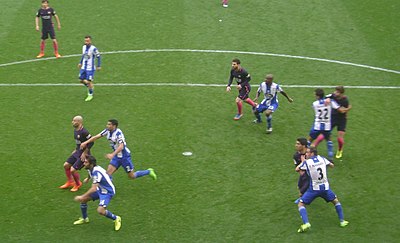
Deportivo La Coruña vs FC Barcelona.
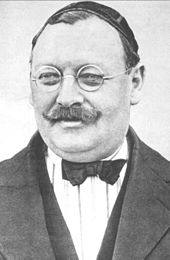
Joan Gamper, founder and five-time president, ensured the existence of the club on several occasions.
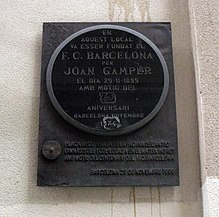
Commemorative plaque at the founding site
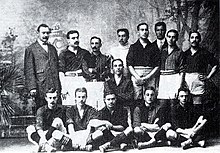
The championship team of FC Barcelona in 1910
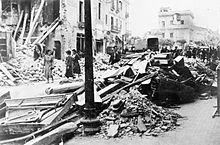
The existence of the association was threatened by the Spanish Civil War.
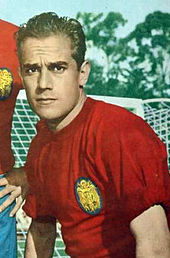
Luis Suárez was a key player in the 1958 and 1960 Fairs Cup wins
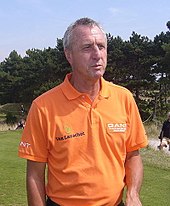
Johan Cruyff is considered an outstanding player and coach in the history of FC Barcelona
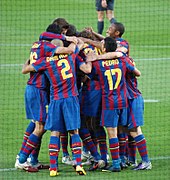
In the 2009/10 season, Barça won the Spanish championship with ten players from their own youth team.
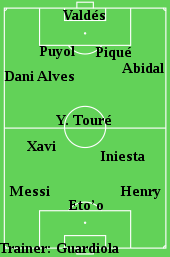
Starting eleven in the 2008/09 triple season
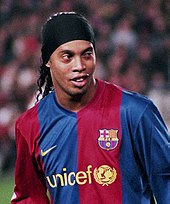
Ronaldinho
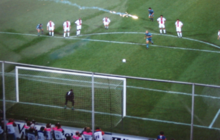
Ronaldo scoring the winning goal in the 1997 European Cup Winners' Cup final
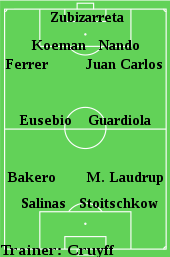
The "dream team" that won the European Champion Clubs' Cup in 1992
Club Concept
Club motto
Its own motto, Més que un club (More than a club), has multiple meanings for FC Barcelona and also reflects the club's complex identity. For Catalans, the club symbolises home and freedom, and the many foreign fans also see Barcelona as a champion of democracy and solidarity.
Figurehead of Catalonia
FC Barcelona sees itself as "the image of the city [Barcelona] and the region of Catalonia". The creator of the club's motto is ex-president Narcís de Carreras, who used it to highlight FC Barcelona's social importance in Catalonia in his inaugural speech in January 1968. The origins of the motto can be found in 1908, when founding father Joan Gamper saved the club from being dissolved. His reasoning for why the club should be preserved is still the basis of Barça's ideology today. His intention was to form a pro-Catalan club as an active representative of the Catalonia region.
Spurred on by industrialization in the 1870s, which reinforced the Catalan region's centuries of economic supremacy, the Catalan people developed an increasingly pronounced national consciousness that intensified the permanent drive for autonomy. After Franco came to power in 1939, Catalonia lost the autonomous status it had received a few years earlier. Under Franco's dictatorship, which massively suppressed the Catalan language and cultural tradition, the status of FC Barcelona amounted to a "social institution". The home games of FC Barcelona were one of the few opportunities for the Catalans to show and preserve their "identity as their own little country". The duels with Real Madrid were particularly important in these years, as the capital club was seen as the embodiment of the Spanish central state.
"Being for the club meant being against the regime. That's why Barça will always be more than just a club."
- Sergi Pàmies
The role of "defender of democracy and freedom" was greatly contributed by the tram boycott of 1951, which is considered the beginning of the anti-Franco resistance. Triggered by an increase in tram fares, the population boycotted the trams. On 4 March, FC Barcelona played a home match against Racing Santander under torrential rain. The government saw this as a good opportunity to break the resistance of the population and sent several trams to the FC Barcelona stadium. But contrary to expectations, Barça fans resolutely flocked home on foot. Not long after, the old fares were reintroduced. This illustrates how much the club had understood how to "root and connect with the essence of the city".
After the democratisation process began in Spain in the mid-1970s and Catalonia regained its autonomous status in 1978, Barça was largely depoliticised under the presidencies of Núñez and Gaspart. It was not until the presidency of Laporta, who has been in the Catalan parliament since 2010, that Barcelona's role as the "unarmed army of Catalonia" returned to the fore. Laporta made the club the most "Catalan" FC Barcelona ever and tried to use the club for an independent Catalonia.
Social commitment
The sports club also underpins its club motto with its social commitment around the world. For this purpose, the Fundació FC Barcelona was founded in 1994, whose aims are to promote sport and education, especially for Third World children, and to promote Catalonia. For this reason, the Foundation has created the XICS and JES projects. Both projects see sport as a key means of improving teaching conditions and social integration. Through the solidarity centres offered by XICS (Xarxa Internacional de Centres Solidaris), around 10,000 local children from developing countries are guaranteed extracurricular education, medical, psychosocial and recreational care, as well as access to sports and leisure activities. The JES (Jornades d'Esport Solidari) organizes sports and leisure activities and takes care of the training of sports teachers.
"We are more than a club ... because we are associated with democracy and the defence of human rights."
- Joan Laporta
Since June 2006, the club has also been committed to upholding the UN Millennium Development Goals and has donated 0.7% of its income to the project each year since the 2006/07 season. A few months later, the club entered into a five-year cooperation agreement with the UN Children's Fund UNICEF. According to this agreement, the association will support UNICEF's work with € 1.5 million annually until 2016 to help children suffering from AIDS in third world countries. Without being obliged to do so, Barça will wear the UNICEF logo on its jerseys for the duration of the agreement - a first for the club, whose jerseys have not been adorned with a company name for over 107 years. FC Barcelona also cooperates with the world cultural organisation UNESCO and the refugee relief organisation UNHCR, working with the organisations to combat racism, doping and violence and to promote education and support refugees. The club was awarded the FIFA Fair Play Award in 2007 for its commitment.
Between 2011 and 2013, FC Barcelona promoted the Qatar Foundation, a non-profit organization that supports various educational projects in the Middle East.
Economy
Business model
FC Barcelona, unlike many other top football clubs, is still organised as a non-profit association rather than a corporation. As such, no shares can be sold to third parties and the primary objective remains the pursuit of sporting goals, rather than making a profit for the shareholders. Any financial stocktaking is generally for internal purposes only and the club is not obliged to disclose its debt level.
When Joan Laporta took over the presidency of FC Barcelona in 2003, Barcelona had accumulated a mountain of debt of over €160 million. As a result, Laporta declared the economic consolidation of the club to be the top priority. In addition to raising ticket prices and reducing wage costs, this was to be achieved in particular by pushing the club's global marketing. From 2003 onwards, the club recruited tens of thousands of new members worldwide with an extensive campaign. A major role in this was played by shirt supplier Nike, with whom the club has a contractual agreement to market the club worldwide. Between 2005 and 2009, the FC Barcelona shirt was sold over 1 million times worldwide, making it the third most sold football shirt.
Between 2009 and 2011, three studies by the University of Navarre showed that FC Barcelona is the most important media brand in world football. It is noteworthy that the club continues to be so strongly linked to Catalonia and the city of Barcelona, where at the same time the number of foreign members is increasing. This is achieved by spreading the "FC Barcelona brand" to all five continents, for example by the team promoting tourism in Catalonia during pre-season, most recently in Asia or the USA.
In the 2010/11 season, FC Barcelona took in €183.7 million in television money, more than any other club. The fact that only Real Madrid in Europe has a comparable amount is due to the decentralised marketing of Spanish TV money in conjunction with the worldwide demand for broadcasts. In Spain, clubs can negotiate the broadcasting rights to their home matches individually with the media companies, which guarantees FC Barcelona an average annual income of €150 million from the television group Mediapro. Barça has also generated above-average revenues in the marketing sector for several years (2010/11: €156.3 million), despite being without a shirt sponsor until 2011. The contract with shirt supplier Nike (until 2018) brings the club around €30 million a year.
In December 2010, the club signed a shirt sponsorship contract for the first time due to the immense financial difficulties. Through this contract with Qatar Sports Investments, FC Barcelona collected €75 million in the first two and a half years. Since the 2013/14 season, the club has been promoting Qatar Airways and will earn at least €96 million over three years.
Following the re-election of the club's president Bartomeu in 2015, a strategic plan for the period until 2021 was announced. The economic goals include an increase in turnover to €1 billion per year and a digitalisation of the club's activities.
Rakuten has been the shirt sponsor since the 2016/17 season. The contract, which runs until the end of the 2020/21 season, will generate €55 million per year for the club.
Finance
With a brand value of $1.3 billion, FC Barcelona is the third most valuable football club in the world, based on data from the 2010/11 season. At the same time, Barça ranked second in the world - behind Real Madrid - with annual revenues of €450.7 million in the given period. This is more than double the value of the 2004/05 season.By 2019, the club was already estimated to be worth $4 billion, putting it in second place among the world's most valuable football clubs. In 2021, FC Barcelona was ranked the number one most valuable football club in the world with a value of $4.76 billion, according to Forbes.
Like the vast majority of first division clubs in Spain, FC Barcelona is in debt. One reason for the high debt is the team's ever-growing budget, which reached a record €494 million in the 2011/12 season. In addition, no other sports club in the world paid its players a larger average total salary ($8.68 million) than FC Barcelona in 2012.
An independent audit, ordered by new president Sandro Rosell, found revenues of €408.9m and expenses of €477.9m for the 2009/10 season, and a gross loss of €83.0m. Ex-president Joan Laporta had reported a net profit of €11m. These were the first losses for FC Barcelona in seven years. In response to the high debt level, Barça reduced its squad and took out a loan of €155 million. With the help of these measures, the club reduced its net debt from €431 million to €364 million by June 2011. The gross loss for the 2010/11 season was €21 million, €62 million less than the previous year. The club generated an additional €23 million in revenue from its sporting successes, but made €4 million less profit than budgeted due to increased premium payments. In the 2011/12 season, the club made a profit of €40 million, reducing gross debt to €320 million. At the beginning of 2012, newspapers stated that FC Barcelona still owed €48 million in taxes to the tax office, but the club itself did not provide any information.
In the 2018/19 season, the above-mentioned sales target was achieved. With a turnover of 990 million euros, there was a profit of 5 million euros. A positive balance has now been achieved for nine years. The accumulated total profit amounts to 213 million euros. For the 2018/19 season, player salaries amounted to 642 million euros. In 2016/17, it was still 432 million euros. In total, the club is indebted to the tune of 217 million euros.
During the 2020/21 season, there were growing signs that the club was in financial distress. Liabilities as of 30 June 2020 amounted to €1.17 billion. The 2019/2020 season ended with a loss after tax of 97 million euros. Revenue fell by 14 percent to 855 million euros. Various media reported an imminent bankruptcy. Due to the COVID-19 pandemic, stadium revenues were falling away. Player salaries were said to be extremely high and responsible for over 70 percent of expenses. The former club management around Josep Maria Bartomeu is accused of having accelerated the financial decline through inadequate transfer tactics. Examples are the overpriced additions of Philippe Coutinho (145 million) or Ousmane Dembélé (120 million). This contrasts with the sales of Arturo Vidal (1 million), Ivan Rakitić (1.5 million) or Luis Suárez (5 million + 6 million bonuses), which have generated hardly any income. Furthermore, there has been criticism of club figurehead Lionel Messi, whose contract details were leaked on the internet in early 2021. He is set to collect up to €555 million over the four seasons between 2017 and 2021, based on performance. According to an economist, Messi brings in around €130 million to €200 million per season for the club. In addition, important advertising contracts of the club are linked to his person. In May 2021, it was announced that the already heavily indebted club will take out a 500 million euro loan from American investment bank Goldman Sachs, with 100 million euros to be paid out immediately to pay off debts due in the summer of 2021.
Youth work
→ Main article: La Masia
FC Barcelona's youth system has produced a number of future internationals, including Lionel Messi, Andrés Iniesta and Xavi, the top three finishers in the 2010 World Player of the Year competition. The club's youth system is considered one of the reasons for the successes of the Guardiola era to date. In 2009, for example, Barça won the UEFA Champions League final against Manchester United with seven La Masia graduates in the starting eleven. In the first team, FC Barcelona's goal is that at least half of the players should have been trained in their own youth department. Dutch coach Johan Cruyff was the first to make extensive use of youth players and decided to apply the same system to all age groups at the club.
The football training is designed for precise and fast short passing, the so-called Tiki-Taka, and less, as usual in other clubs, on physical training. Until the age of 16, players do not do any strength training or endurance running. Strength, endurance and speed are only to be improved through excessive training with the ball. The focus is on playing fast in a minimum of space, combined with the acquisition of technical skills.
FC Barcelona's youth academy, La Masia, has been located in the Ciutat Esportiva Joan Gamper, the club's training ground, since October 2011. Between 1979 and 2011, it was housed in a Catalan country house located a few metres from Camp Nou. On 14 April 2014, the U19s won the first edition of the UEFA Youth League against Benfica Lisbon U19s in Nyon, Switzerland. The UEFA Youth League success was repeated in 2017/18 with a win against Chelsea U19s.
The model came under repeated criticism in the 2017/18 season, when the first team started without a player from their youth academy in the starting eleven for the first time since 2002. In the November 2012 match against Levante, all of Barça's starting players had roots in La Masia.
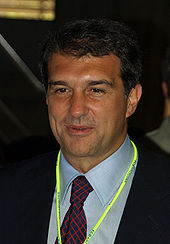
The worldwide marketing of the club was a main goal of president Laporta
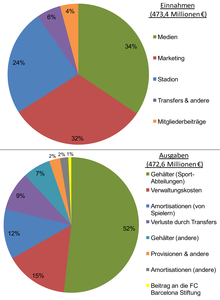
Graphical representation of income and expenses in the 2010/11 season
_(Barcelona)_-_1.jpg)
La Masia - The former youth academy of FC Barcelona
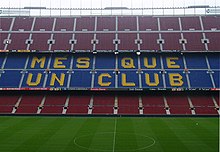
The club motto is a central basic motif of FC Barcelona
Search within the encyclopedia